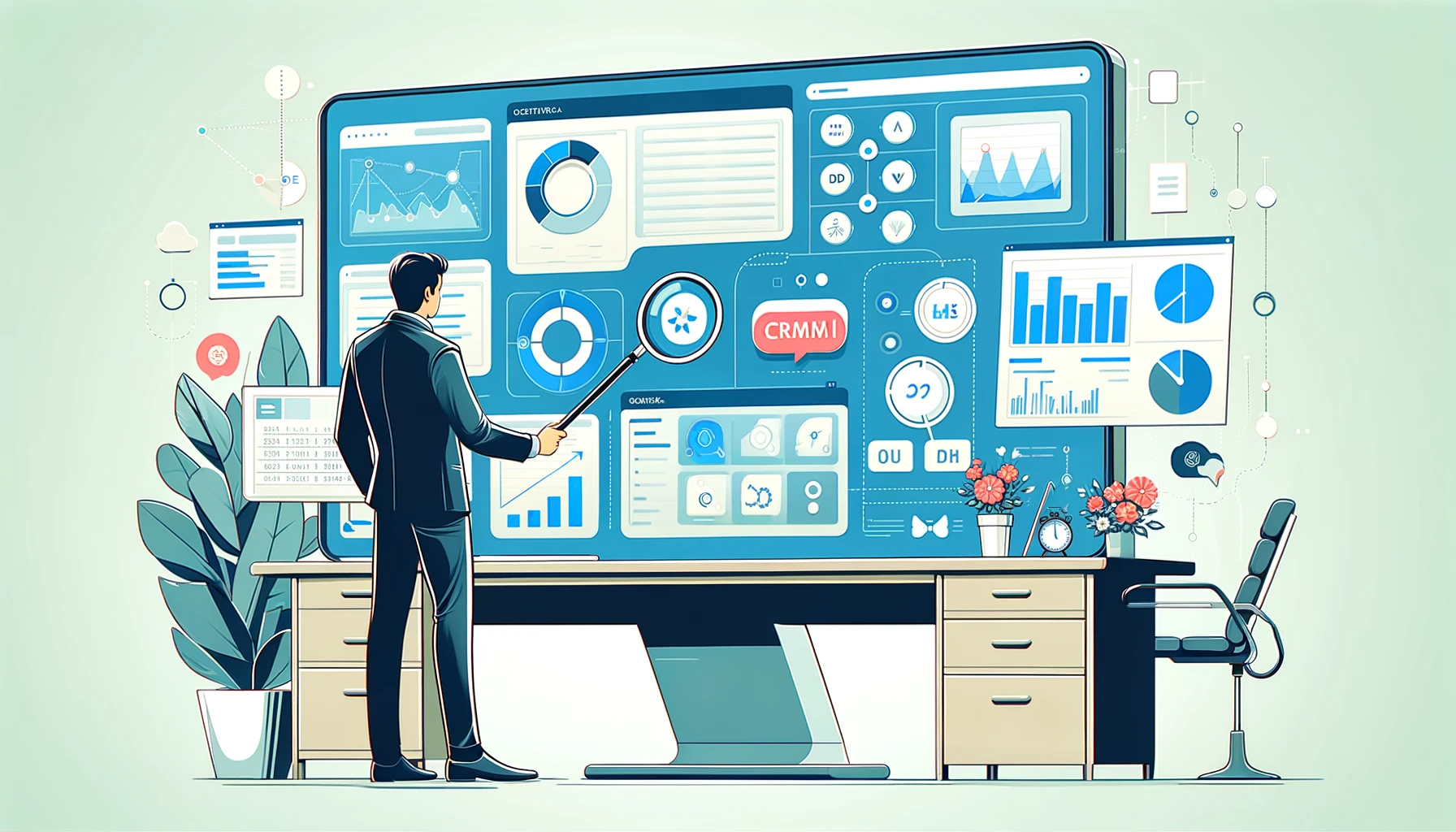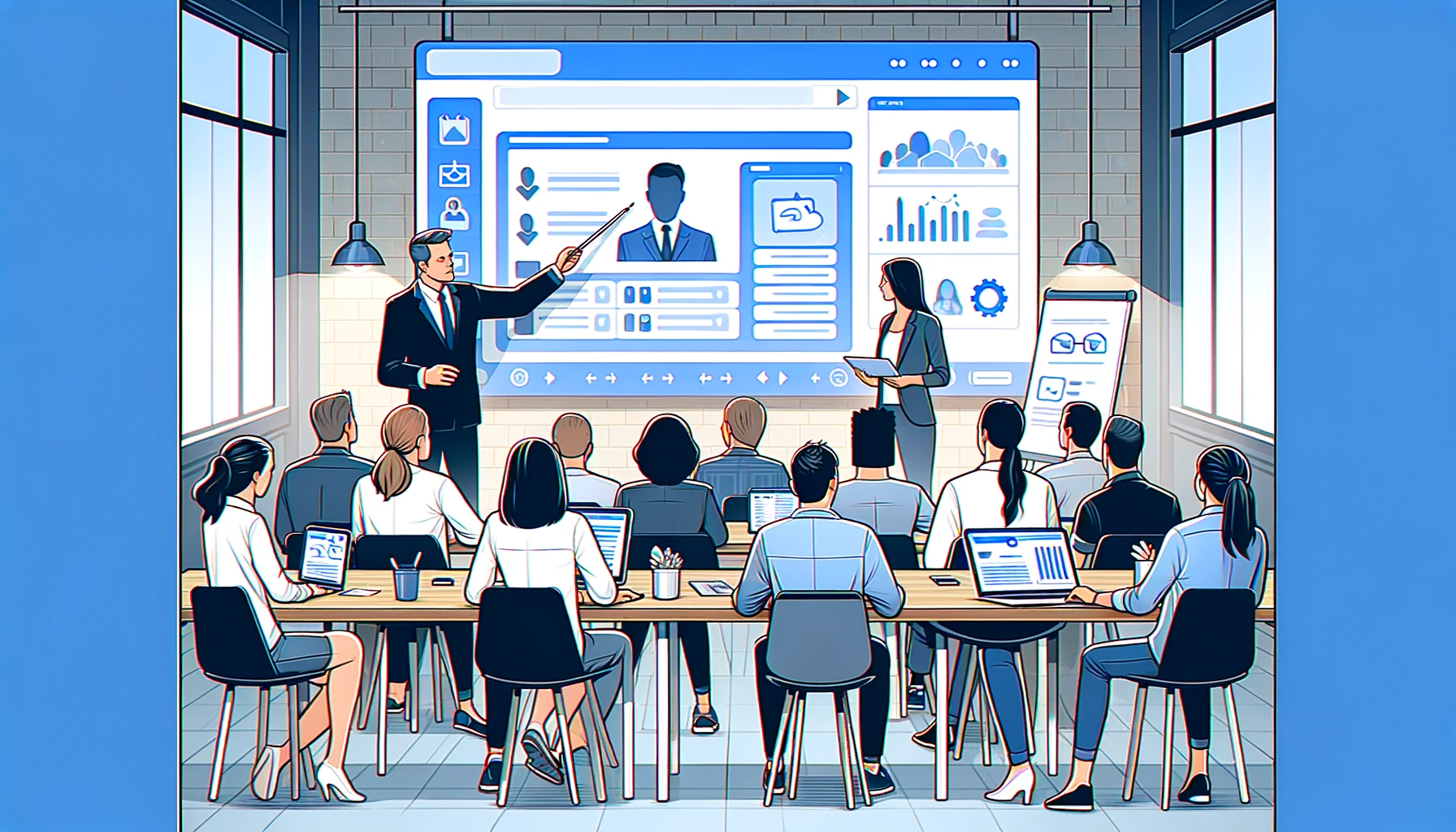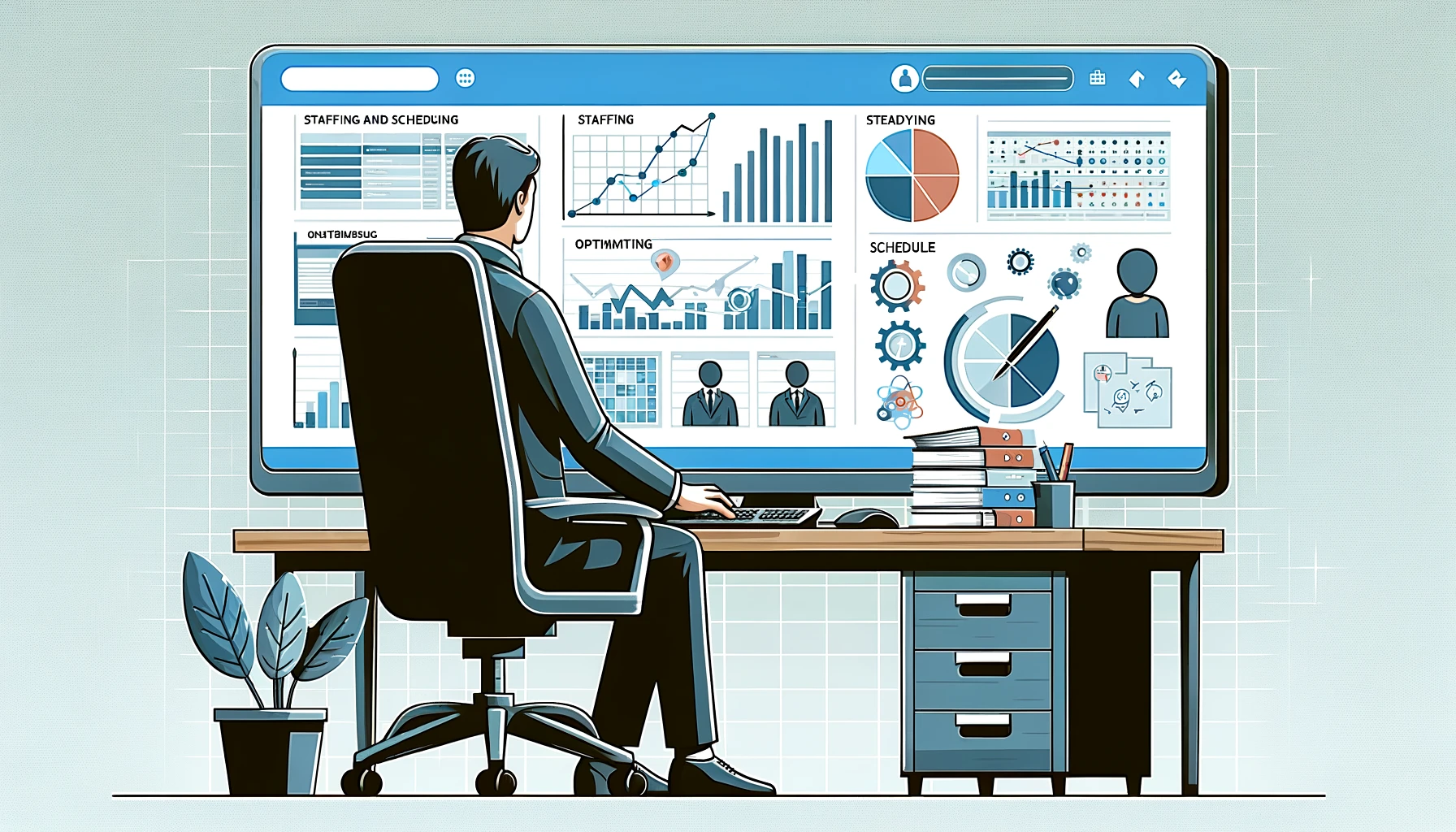2024 Staffing & Scheduling: Key to Success

Unlock 2024's best staffing and scheduling strategies for peak efficiency and worker satisfaction.
Staffing and Scheduling: The Heartbeat of Business Efficiency
In the dynamic world of business, mastering the art of staffing and scheduling can be the linchpin to achieving operational efficiency. Whether you’re managing a small enterprise or a multinational corporation, the right approach to this crucial aspect can make or break your business success.
Staffing and scheduling are often seen as mundane administrative tasks, but they are much more than that. They are strategic activities that require foresight, precision, and adaptability. With effective staffing and scheduling, a company can ensure that the right people are in the right place at the right time, maximizing productivity and minimizing costs.
Consider the impact on a retail business, for instance. Efficient staffing and scheduling would mean having enough employees during peak shopping hours to provide excellent customer service, while avoiding unnecessary labor costs during quieter periods. It’s a delicate balance that requires careful planning and execution.
Enter CRM software. With its comprehensive features and intuitive interface, CRM software has become an essential tool for businesses seeking to optimize their staffing and scheduling processes. It provides real-time visibility into employee availability, skills, and workload, enabling managers to make informed decisions and adapt quickly to changes.

Moreover, CRM software offers automated scheduling solutions that eliminate the risk of human error. It can identify the best times to schedule meetings, allocate resources, and assign tasks based on a variety of factors, such as employee preferences, workload, and productivity patterns. This level of automation not only saves time and effort but also increases accuracy and efficiency.
Let’s look at some of the key benefits of using CRM software for staffing and scheduling:
- Improved productivity: By aligning staff availability with business needs, companies can maximize their workforce’s productivity.
- Cost savings: Efficient scheduling helps avoid overstaffing or understaffing, both of which can lead to unnecessary costs.
- Enhanced employee satisfaction: Transparent and fair scheduling can lead to higher job satisfaction and lower turnover rates.
- Better customer service: Having the right staff at the right time ensures that customers’ needs are met promptly and effectively.
While staffing and scheduling may seem like a small part of business operations, they hold immense potential for enhancing efficiency and performance. By leveraging the power of CRM software, businesses can transform this potential into tangible results, driving growth and success in the competitive marketplace.
Leveraging CRM Software for Smarter Staffing and Scheduling
As businesses navigate the intricate labyrinth of modern commerce, the role of CRM software in enhancing staffing and scheduling becomes increasingly clear. It’s like having a digital assistant that never sleeps, constantly analyzing, organizing, and optimizing your staffing needs according to the rhythm of your business.
A smart CRM system is like a chess master, always thinking several moves ahead. It anticipates staffing needs based on historical data, current trends, and future projections. This proactive approach allows businesses to stay one step ahead, ensuring that they are always prepared for whatever the market throws at them.

For example, a CRM system can analyze past sales data to predict when customer demand will peak, ensuring that your team is adequately staffed to handle the influx. It can also identify patterns in employee productivity, enabling you to schedule staff during their most productive hours. This leads to a more efficient use of your workforce, ultimately saving you time and money.
Here are some ways a company can leverage CRM software for smarter staffing and scheduling:
- Data-driven decision making: CRM software provides valuable insights into staff performance and customer behavior, enabling managers to make informed staffing decisions.
- Automated scheduling: CRM systems can automate the scheduling process, saving managers time and reducing the risk of errors.
- Improved communication: With CRM, staff can easily view their schedules, request changes, and communicate with their managers, leading to better engagement and satisfaction.
To illustrate the impact of CRM software on staffing and scheduling, let’s consider the following scenario: A retail company used to struggle with overstaffing during slow periods and understaffing during peak hours. After implementing a CRM system, they were able to align their staffing levels with customer demand, resulting in a ~30% reduction in labor costs and a ~20% increase in customer satisfaction.
In essence, CRM software provides a strategic approach to staffing and scheduling. It helps businesses navigate the complexities of modern commerce, ensuring that they are always prepared for whatever the market throws at them.

The Impact of CRM Software on Your Staffing and Scheduling Needs
The Impact of CRM Software on Your Staffing and Scheduling Needs
Navigating the complexities of staffing and scheduling can be a daunting task. However, with the right tools, these complexities can be managed effectively, leading to improved efficiency and productivity. CRM software is one such tool that has proven to be a game changer in this regard.
Integrating CRM software into your staffing and scheduling processes can lead to a significant transformation in your business operations. It allows for the seamless management of staff, streamlining the process of assigning tasks and tracking employee performance. This leads to higher productivity levels and increased employee satisfaction.

One of the key benefits of CRM software is its ability to provide real-time data. This data-driven approach allows for informed decision making, enabling businesses to align their staffing strategies with their operational needs. For example, a restaurant might notice that they get more customers during lunch hours on weekdays. With this information, they can ensure that they have enough staff scheduled for these peak hours, thus improving their service delivery.
Here are some ways CRM software impacts your staffing and scheduling needs:
- Real-time data: CRM software provides valuable insights into employee performance and availability, helping managers make informed staffing decisions.
- Efficient resource allocation: With CRM software, businesses can optimize their staffing, ensuring that resources are allocated where they are needed most.
- Improved communication: CRM software facilitates easy communication between managers and staff, leading to better coordination and increased efficiency.

Additionally, CRM software can automate many of the tasks associated with staffing and scheduling. This not only saves time but also reduces the chances of error, leading to more accurate and efficient scheduling.
To sum it up, CRM software can have a profound impact on your staffing and scheduling needs. By providing real-time data and automating scheduling tasks, it enables businesses to optimize their staffing strategies, leading to improved efficiency and productivity.
Real-life Examples: CRM Software Elevating Staffing and Scheduling
In the realm of healthcare, a large hospital was facing challenges in allocating the right medical staff to the right departments at the right time. They were dealing with issues such as overstaffing during off-peak hours and understaffing during emergencies. After implementing CRM software into their processes, they were able to optimize their staffing and scheduling. The software provided real-time data about each department’s needs, enabling the hospital to allocate resources more efficiently. As a result, they experienced a ~20% increase in operational efficiency and a significant decrease in labor costs.
In the service industry, a leading hotel chain was struggling with managing their staff across different locations. Their manual process was time-consuming and often led to errors. By incorporating CRM software, they were able to automate their staffing and scheduling tasks. The system provided insights into peak check-in and check-out times, helping the hotel to schedule the right number of staff during these periods. This led to improved customer service, with a ~15% rise in customer satisfaction scores.

In the manufacturing sector, a factory was grappling with production delays due to inefficient staffing and scheduling. After adopting CRM software, they could align their staffing strategies with their operational needs. The software provided insights into the most productive shifts and helped in allocating tasks to employees based on their skills and efficiency. This resulted in a 25% increase in production and a significant reduction in downtime.
These examples clearly demonstrate how CRM software can elevate staffing and scheduling across different industries. By providing real-time data, automating tasks, and enabling efficient resource allocation, CRM software can significantly enhance operational efficiency and productivity.
| Industry | Challenges | CRM Implementation | Results |
|---|---|---|---|
| Healthcare | Staffing issues during off-peak hours and emergencies | Real-time data on departmental needs | 20% increase in operational efficiency |
| Service Industry | Managing staff across different locations | Insights into peak check-in and check-out times | 15% rise in customer satisfaction scores |
| Manufacturing | Production delays due to inefficient staffing and scheduling | Alignment of staffing strategies with operational needs | 25% increase in production |
Kickstarting Your Journey with CRM for Enhanced Staffing and Scheduling
Embarking on the path of implementing CRM for staffing and scheduling can feel like a leap into the unknown. However, the transformative benefits it brings make this leap more of an exciting adventure. The first step, as with any journey, is understanding your destination and the route you need to take to get there.
To begin with, understanding your business needs is crucial. This involves identifying the key challenges in your staffing and scheduling processes. Are you facing issues with overstaffing or understaffing? Is your scheduling process time-consuming and prone to errors? Identifying these pain points will help you choose the right CRM software that addresses your specific needs.

Next, consider the features you need in a CRM system. Here are some key features to look for:
- Real-time data: This allows you to make informed decisions based on the latest information.
- Automated scheduling: This saves time and reduces the risk of errors.
- Data analytics: This provides insights into staffing patterns, helping you optimize your staffing strategies.
Once you have your CRM system in place, it’s time to train your staff. Ensure they understand how to use the system effectively. This includes teaching them how to input data correctly, interpret the data provided by the system, and use it to make informed decisions.

Finally, monitor the results. Keep track of key metrics such as productivity levels, labor costs, and customer satisfaction. This will help you assess the impact of the CRM system on your staffing and scheduling processes and make necessary adjustments.
In essence, implementing CRM for staffing and scheduling is a strategic move that can significantly enhance your business operations. With careful planning and execution, this journey can lead to improved efficiency, cost savings, and higher employee satisfaction.
| Steps to Implement CRM | Key Points |
|---|---|
| Understanding Business Needs | Identify staffing and scheduling challenges. |
| Choosing the Right CRM | Look for features like real-time data, automated scheduling, and data analytics. |
| Training Staff | Ensure staff understand how to use the system effectively. |
| Monitoring Results | Track key metrics to assess the impact of the CRM system. |
FAQs on Staffing and Scheduling
-
What Is the Importance of Effective Staffing and Scheduling? Effective staffing and scheduling are crucial for optimizing workforce productivity and ensuring the right number of employees are available at the right times to meet demand. This balance helps in reducing labor costs, improving customer service, and enhancing employee satisfaction by accommodating their preferences whenever possible.
-
How Can Businesses Improve Their Staffing and Scheduling Processes? Businesses can improve their staffing and scheduling by using advanced scheduling software that analyzes demand forecasts, employee availability, and skill sets. Implementing flexible scheduling practices and involving employees in the scheduling process can also lead to more efficient operations and higher job satisfaction.
-
What Are Some Common Challenges in Staffing and Scheduling? Common challenges include handling unexpected absences, accommodating employee preferences, predicting customer demand accurately, and managing overtime costs. Balancing the needs of the business with the preferences of employees often requires careful planning and flexibility.
-
Can Technology Aid in Solving Staffing and Scheduling Issues? Yes, technology plays a critical role in addressing staffing and scheduling challenges. Modern workforce management systems offer features like demand forecasting, automated scheduling, time and attendance tracking, and analytics. These tools help managers make data-driven decisions and streamline the scheduling process.
-
What Are Best Practices for Effective Staffing and Scheduling? Best practices include using data to forecast demand accurately, creating schedules in advance, maintaining open communication with employees, offering scheduling flexibility, and continuously monitoring and adjusting schedules based on actual business needs. Regularly reviewing staffing levels and productivity metrics can also identify areas for improvement.
Read more about low-code platform ozma.io
Human Resource Management: Maximizing CRM Integration





